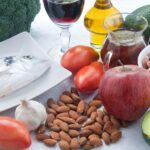Vitamin B2, also known as riboflavin, is essential for energy production, cell growth, and the metabolism of fats. Curious about “Which Food Contain Vitamin B2”? Look no further! FOODS.EDU.VN provides a comprehensive list of riboflavin-rich foods and highlights the significance of this essential nutrient for your overall health. This guide will explore the best dietary sources to ensure you meet your daily requirements and optimize your well-being, from dairy products to leafy greens and everything in between, plus addressing riboflavin benefits and potential deficiencies.
1. What is Vitamin B2 (Riboflavin) and Why Do You Need It?
Vitamin B2, commonly known as riboflavin, is a water-soluble vitamin that plays a crucial role in maintaining overall health. This means it dissolves in water and isn’t stored in the body, so you need to get it regularly from your diet. But why is riboflavin so vital?
- Energy Production: Riboflavin is a key component of enzymes involved in energy production. It helps convert the food you eat into usable energy, supporting your daily activities and bodily functions.
- Cell Growth and Function: It’s essential for the growth, development, and function of cells. It plays a role in DNA repair and helps maintain healthy skin, hair, and nails.
- Metabolism of Fats, Steroids, and Medications: Riboflavin assists in the breakdown of fats, steroids, and medications, ensuring they are processed efficiently by the body.
According to the National Institutes of Health (NIH), riboflavin is crucial for several bodily processes and is typically obtained through diet or supplements. FOODS.EDU.VN emphasizes the importance of understanding the roles of riboflavin and incorporating it into your diet.
2. What are the Recommended Daily Intakes of Vitamin B2?
Ensuring you get enough vitamin B2 is crucial for maintaining optimal health. The recommended daily intakes vary depending on age, sex, and life stage:
| Group | Recommended Dietary Allowance (RDA) |
|---|---|
| Men (19+ years) | 1.3 mg |
| Women (19+ years) | 1.1 mg |
| Pregnancy | 1.4 mg |
| Lactation | 1.6 mg |







Source: National Institutes of Health (NIH)
These recommendations ensure that your body has enough riboflavin to support its essential functions, like energy production and cell growth. Remember that these are general guidelines, and individual needs may vary. If you’re unsure about your specific requirements, consulting with a healthcare professional is always a good idea.
3. Which Food Groups Are The Best Sources of Vitamin B2?
To ensure you’re getting enough riboflavin in your diet, it’s essential to know which food groups are the best sources. Here’s a breakdown:
- Dairy Products: Milk, yogurt, and cheese are excellent sources of riboflavin. For example, one cup of milk provides about 26% of the daily recommended value.
- Meat and Poultry: Lean beef, pork, and chicken are good sources of riboflavin. Organ meats like liver are particularly rich in this vitamin.
- Eggs: Eggs are a versatile and nutritious option. One large egg contains about 15% of the daily recommended value of riboflavin.
- Fish: Salmon and other types of fish provide a good amount of riboflavin.
- Fortified Foods: Many cereals, breads, and other grains are fortified with riboflavin, making them a convenient way to boost your intake.
- Nuts and Seeds: Almonds and other nuts contain riboflavin, along with other essential nutrients.
- Green Vegetables: Spinach and other leafy green vegetables offer riboflavin along with a host of other vitamins and minerals.
Incorporating a variety of these food groups into your daily meals is an easy way to ensure you’re meeting your riboflavin needs. According to a study published in the Journal of the American College of Nutrition, a balanced diet that includes these food groups is essential for overall health and well-being.
4. What Specific Dairy Products Are High in Vitamin B2?
Dairy products are renowned for being rich in riboflavin. Here are some specific dairy items that stand out:
- Milk: A glass of milk is a simple and effective way to increase your riboflavin intake. One cup provides approximately 0.43 mg of riboflavin, which is about 33% of the recommended daily intake.
- Yogurt: Yogurt is another excellent choice, offering both riboflavin and probiotics. A cup of plain yogurt can contain around 0.34 mg of riboflavin, fulfilling about 26% of your daily needs.
- Cheese: Various cheeses, such as cheddar, Swiss, and mozzarella, contain riboflavin. For instance, an ounce of cheddar cheese provides about 0.12 mg of riboflavin, contributing to your overall intake.
These dairy options are not only high in riboflavin but also provide other essential nutrients like calcium and protein, making them valuable additions to your diet.
5. Which Meats and Poultry Are Good Sources of Vitamin B2?
For those looking to boost their riboflavin intake through meat and poultry, here are some excellent choices:
- Lean Beef: Lean cuts of beef are a good source of riboflavin. A 3-ounce serving can provide about 0.15 mg of riboflavin.
- Pork: Pork is another reliable source, with similar riboflavin content to beef.
- Organ Meats (Liver): Organ meats, particularly beef liver, are exceptionally high in riboflavin. A 3-ounce serving of beef liver can contain as much as 2.9 mg of riboflavin, significantly exceeding the daily recommended intake.
- Chicken Breast: While not as high as organ meats, chicken breast still offers a decent amount of riboflavin. A 3-ounce serving provides about 0.1 mg of riboflavin.
Including these meats and poultry in your diet can help you meet your daily riboflavin requirements, contributing to overall health and energy levels.
6. How Do Eggs Contribute to Your Vitamin B2 Intake?
Eggs are a versatile and nutritious food that can significantly contribute to your daily riboflavin intake.
- Riboflavin Content: One large egg contains approximately 0.2 mg of riboflavin, which is about 15% of the recommended daily value. This makes eggs a convenient and accessible way to boost your intake of this essential vitamin.
- Nutritional Benefits: In addition to riboflavin, eggs are packed with other essential nutrients like protein, vitamins A and D, and choline. These nutrients work together to support overall health, including muscle function, vision, and brain health.
- Versatile Cooking Options: Eggs can be prepared in countless ways, from scrambled to boiled to fried, making it easy to incorporate them into your diet regardless of your culinary preferences.
Incorporating eggs into your regular diet is a simple and effective way to ensure you’re getting a steady supply of riboflavin and other vital nutrients.
7. What Types of Fish Are Rich in Vitamin B2?
Fish is not only a great source of protein and omega-3 fatty acids but also a good provider of riboflavin. Here are some types of fish that are particularly rich in vitamin B2:
- Salmon: Salmon is one of the best fish sources of riboflavin. A 3-ounce serving of cooked salmon contains approximately 0.18 mg of riboflavin, which is about 14% of the daily recommended intake.
- Trout: Trout is another excellent choice, offering a similar amount of riboflavin as salmon.
- Mackerel: Mackerel is a fatty fish that provides a good dose of riboflavin along with healthy fats.
- Tuna: Tuna also contributes to your riboflavin intake, though slightly less than salmon or trout.
Including these types of fish in your diet not only boosts your riboflavin levels but also provides numerous other health benefits, making them a valuable addition to a balanced eating plan.
8. How Do Fortified Foods Help in Meeting Vitamin B2 Requirements?
Fortified foods can play a significant role in helping you meet your daily riboflavin requirements.
- What are Fortified Foods? Fortified foods are those that have nutrients added to them that are not naturally present or are present in small amounts. This process is intended to improve the nutritional value of the food.
- Common Fortified Foods:
- Cereals: Many breakfast cereals are fortified with riboflavin and other B vitamins.
- Breads and Grains: Some breads, flours, and grains are also fortified with riboflavin.
- Pasta: Fortified pasta can contribute to your riboflavin intake.
- Benefits of Fortified Foods: Fortified foods are a convenient way to ensure you’re getting enough riboflavin, especially if you have dietary restrictions or don’t consume many natural sources of the vitamin. They can help prevent deficiencies and support overall health.
- How to Choose Fortified Foods: When selecting fortified foods, check the nutrition labels to ensure they contain riboflavin and other essential nutrients. Choose options that are low in added sugars, sodium, and unhealthy fats.
Incorporating fortified foods into your diet can be an effective strategy for meeting your riboflavin needs, particularly when combined with a variety of natural sources.
9. Which Nuts and Seeds Provide Vitamin B2?
Nuts and seeds are not only a great source of healthy fats and protein, but some also offer riboflavin. Here are some of the best nuts and seeds to include in your diet for a riboflavin boost:
- Almonds: Almonds are a standout choice, providing approximately 0.4 mg of riboflavin per 100 grams, which is about 31% of the daily recommended intake.
- Other Nuts: While almonds are the richest source, other nuts like hazelnuts and macadamia nuts also contain small amounts of riboflavin.
- Seeds: Seeds like sunflower seeds and pumpkin seeds offer trace amounts of riboflavin, contributing to your overall intake.
Including a variety of nuts and seeds in your diet can provide a steady supply of riboflavin along with other beneficial nutrients, making them a healthy and convenient snack option.
10. How Do Green Vegetables Contribute to Vitamin B2 Intake?
Green vegetables are an essential part of a healthy diet and contribute to your vitamin B2 intake in several ways:
- Leafy Greens: Spinach, kale, and collard greens are excellent sources of riboflavin. One cup of cooked spinach contains about 0.43 mg of riboflavin, which is approximately 33% of the recommended daily intake.
- Other Green Vegetables: Broccoli, Brussels sprouts, and asparagus also provide riboflavin, although in smaller amounts compared to leafy greens.
- Nutritional Benefits: Besides riboflavin, green vegetables are rich in other essential vitamins, minerals, and antioxidants. These nutrients support overall health, including immune function, vision, and cell growth.
- Versatile Cooking Options: Green vegetables can be prepared in numerous ways, from steaming and sautéing to adding them to salads and soups. This versatility makes it easy to incorporate them into your daily meals.
Incorporating a variety of green vegetables into your diet ensures you’re getting a consistent supply of riboflavin and other vital nutrients, promoting optimal health and well-being.
11. What Are the Signs and Symptoms of Vitamin B2 Deficiency?
A vitamin B2 deficiency, also known as ariboflavinosis, is relatively rare in developed countries, but it can occur, especially in individuals with poor diets or certain medical conditions. Recognizing the signs and symptoms of a deficiency is crucial for timely intervention.
- Cracked Lips (Cheilosis): One of the most common signs of riboflavin deficiency is cracking and soreness at the corners of the mouth.
- Sore Throat: A sore throat can be another symptom, making swallowing uncomfortable.
- Swelling of the Mouth and Throat: Inflammation and swelling in the mouth and throat can occur.
- Swollen Tongue (Glossitis): The tongue may become swollen, red, and inflamed.
- Hair Loss: Hair loss can be a symptom of prolonged riboflavin deficiency.
- Skin Rash: A scaly, itchy rash, particularly around the nose and mouth, may develop.
- Anemia: Riboflavin deficiency can interfere with iron absorption, leading to anemia.
- Itchy Red Eyes: The eyes may become itchy, red, and sensitive to light.
- Cataracts: In severe and prolonged cases, riboflavin deficiency can contribute to the development of cataracts.
If you experience any of these symptoms, it’s essential to consult a healthcare professional. They can assess your condition and recommend appropriate treatment, which may include dietary changes or riboflavin supplements.
12. Who Is at Risk of Vitamin B2 Deficiency?
Several groups are at higher risk of developing a vitamin B2 deficiency. Understanding these risk factors can help you take proactive steps to ensure adequate riboflavin intake.
- Vegans and Vegetarians: Those who exclude dairy and meat products from their diet are at a higher risk, as these are primary sources of riboflavin.
- Pregnant Women: Pregnant women have increased nutrient needs, including riboflavin, to support the growing fetus.
- Lactating Women: Breastfeeding women also require higher amounts of riboflavin to meet the needs of their infants.
- Individuals with Thyroid Disorders: Thyroid disorders can interfere with the absorption and utilization of riboflavin.
- Malnourished Individuals: People with poor diets or malabsorption issues are at risk of multiple nutrient deficiencies, including riboflavin.
- Alcoholics: Excessive alcohol consumption can impair the absorption and utilization of riboflavin.
- Elderly Individuals: Older adults may have decreased appetite and nutrient absorption, increasing their risk of deficiency.
If you belong to any of these groups, it’s crucial to pay close attention to your riboflavin intake and consider consulting with a healthcare professional or registered dietitian to ensure you’re meeting your needs.
13. Can You Consume Too Much Vitamin B2? What Are the Potential Risks?
Vitamin B2 is a water-soluble vitamin, which means that excess amounts are typically excreted in the urine rather than stored in the body. As a result, vitamin B2 toxicity is rare.
- No Established Upper Limit: There is no established Tolerable Upper Intake Level (UL) for riboflavin because no adverse effects have been observed from high intakes of riboflavin from food or supplements.
- Limited Absorption: The body can only absorb a limited amount of riboflavin at one time, further reducing the risk of toxicity.
- Bright Yellow Urine: One harmless side effect of taking high doses of riboflavin supplements is that it can turn your urine a bright yellow color. This is simply due to the excretion of excess riboflavin.
- Potential Interactions: While riboflavin toxicity is unlikely, high doses of any nutrient can potentially interact with certain medications or exacerbate existing health conditions. It’s always best to consult with a healthcare professional before taking high-dose supplements.
While it’s essential to ensure you’re getting enough riboflavin, there’s generally no need to worry about consuming too much, especially from food sources. However, moderation and consultation with a healthcare provider are always advised when considering supplements.
14. How Does Vitamin B2 Interact with Other Nutrients?
Vitamin B2 works closely with other nutrients to support various bodily functions. Understanding these interactions can help you optimize your nutrient intake for better health.
- Other B Vitamins: Riboflavin interacts with other B vitamins, such as B6, folate, and B12, in the metabolism of homocysteine. These vitamins help break down homocysteine, an amino acid that, when present at high levels, is a risk factor for cardiovascular disease.
- Iron: Riboflavin helps with the absorption of iron in the gut. A deficiency in riboflavin can impair iron absorption, potentially leading to anemia.
- Vitamin A: Riboflavin is needed for the conversion of vitamin A into its active form. Adequate riboflavin intake ensures that vitamin A can perform its functions, such as supporting vision and immune function.
- Antioxidant Enzymes: Riboflavin is essential for the production of antioxidant enzymes, which protect the body against damage from free radicals.
By ensuring you have adequate intakes of riboflavin and these interacting nutrients, you can support optimal health and prevent deficiencies. A balanced diet that includes a variety of nutrient-rich foods is the best way to achieve this.
15. What Role Does Vitamin B2 Play in Migraine Prevention?
Riboflavin has been studied for its potential role in migraine prevention. Research suggests that high doses of riboflavin may help reduce the frequency and severity of migraines.
- Oxidative Stress and Inflammation: Riboflavin helps reduce oxidative stress and inflammation of nerves, which are believed to contribute to migraine headaches.
- Mitochondrial Function: Riboflavin is needed for normal mitochondrial activities. Migraines are sometimes caused by mitochondrial abnormalities in the brain, and riboflavin may help improve mitochondrial function.
- Clinical Studies: Some clinical trials have shown that riboflavin supplementation can reduce the frequency of migraine attacks. For example, one study found that 400 mg of riboflavin daily reduced migraine frequency by two attacks per month compared to a placebo.
- Recommendations: The American Academy of Neurology and the American Headache Society have concluded that riboflavin is probably effective for preventing migraine headaches and have approved its use as a complementary treatment.
While riboflavin may not be a cure for migraines, it can be a helpful addition to a comprehensive treatment plan. If you suffer from migraines, talk to your healthcare provider about whether riboflavin supplementation is right for you.
16. How Does Vitamin B2 Affect Cardiovascular Health?
Riboflavin plays a role in cardiovascular health by helping to regulate homocysteine levels in the blood.
- Homocysteine Metabolism: Riboflavin, along with other B vitamins like B6, folate, and B12, is involved in the breakdown of homocysteine. High levels of homocysteine are a risk factor for cardiovascular disease.
- Antioxidant Effects: Riboflavin helps produce antioxidant enzymes that protect the heart from damage caused by free radicals.
- Animal Studies: Animal studies have shown that riboflavin deficiency can lead to heart abnormalities and increased biomarkers for heart disease.
- Human Studies: However, epidemiological studies have not consistently shown that lowering homocysteine levels with B vitamin supplementation reduces the risk of heart attacks or deaths from cardiovascular disease.
While riboflavin is important for cardiovascular health, it’s just one piece of the puzzle. Maintaining a healthy lifestyle, including a balanced diet, regular exercise, and avoiding smoking, is essential for preventing heart disease.
17. What Are Some Delicious Recipes That Are High in Vitamin B2?
Incorporating riboflavin-rich foods into your diet can be both nutritious and delicious. Here are a few recipe ideas:
- Spinach and Feta Omelet: Start your day with a protein-packed omelet filled with spinach and feta cheese. Spinach is a great source of riboflavin, while eggs provide protein and other essential nutrients.
- Salmon with Roasted Vegetables: Bake or grill a salmon fillet and serve it with a side of roasted vegetables like broccoli, Brussels sprouts, and sweet potatoes. Salmon is rich in riboflavin and omega-3 fatty acids, while the vegetables provide fiber and other vitamins and minerals.
- Chicken Liver Pate: For a more adventurous option, try making chicken liver pate. Liver is an excellent source of riboflavin, and pate is a delicious way to enjoy it. Serve with whole-grain crackers or toast.
- Yogurt Parfait with Almonds and Berries: Create a healthy and satisfying snack or dessert by layering yogurt with almonds and berries. Yogurt is a good source of riboflavin, while almonds provide healthy fats and berries are rich in antioxidants.
- Fortified Cereal with Milk and Fruit: A simple and convenient breakfast option is to enjoy a bowl of fortified cereal with milk and your favorite fruit. Choose a cereal that is fortified with riboflavin and other B vitamins.
These recipes are just a starting point. Get creative and experiment with different riboflavin-rich foods to find your favorite ways to incorporate this essential vitamin into your diet.
18. How Can You Ensure Adequate Vitamin B2 Intake on a Vegetarian or Vegan Diet?
Ensuring adequate riboflavin intake on a vegetarian or vegan diet requires careful planning, as many of the richest sources of riboflavin are animal products.
- Focus on Plant-Based Sources: Include plenty of plant-based sources of riboflavin in your diet, such as spinach, almonds, mushrooms, and fortified foods.
- Fortified Foods: Look for fortified cereals, breads, and plant-based milks that contain added riboflavin.
- Nutritional Yeast: Nutritional yeast is a deactivated yeast that is often fortified with B vitamins, including riboflavin. It has a cheesy flavor and can be used in sauces, dips, and as a topping for pasta and popcorn.
- Variety is Key: Eat a wide variety of nutrient-rich foods to ensure you’re getting all the vitamins and minerals you need.
- Consider a Supplement: If you’re concerned about meeting your riboflavin needs through diet alone, talk to your healthcare provider about whether a riboflavin supplement is right for you.
With careful planning and attention to dietary choices, it’s entirely possible to get enough riboflavin on a vegetarian or vegan diet.
19. What is the Relationship Between Light Exposure and Vitamin B2 in Milk?
Riboflavin is sensitive to light, particularly ultraviolet (UV) light. This is why milk is no longer commonly sold in glass bottles.
- Light Degradation: When milk is exposed to light, the riboflavin in the milk can be degraded, reducing its nutritional value.
- Packaging: To protect riboflavin from light damage, milk is now typically sold in opaque containers, such as cartons or plastic jugs, that block out light.
- Storage: To further protect the riboflavin in milk, store it in the refrigerator away from direct light.
- Impact on Other Foods: This light sensitivity isn’t exclusive to milk; it affects other foods containing riboflavin, emphasizing the importance of proper storage in dark or opaque containers to maintain their nutritional content.
This light sensitivity is why you don’t usually see milk stored in glass bottles anymore. The packaging helps to preserve the riboflavin content, ensuring that you’re getting the full nutritional benefits of the milk.
20. What Are Some Common Myths About Vitamin B2?
There are several myths and misconceptions surrounding vitamin B2. Separating fact from fiction can help you make informed decisions about your diet and health.
- Myth: You can get all the riboflavin you need from supplements alone.
- Fact: While supplements can be helpful, it’s always best to get your nutrients from whole foods whenever possible. Whole foods provide a variety of vitamins, minerals, and other beneficial compounds that work together to support health.
- Myth: Vitamin B2 deficiency is common in developed countries.
- Fact: Vitamin B2 deficiency is relatively rare in developed countries, thanks to the availability of fortified foods and a varied diet.
- Myth: Taking large doses of vitamin B2 will give you more energy.
- Fact: While riboflavin is essential for energy production, taking large doses won’t necessarily give you a significant energy boost if you’re already getting enough.
- Myth: All forms of vitamin B2 supplements are the same.
- Fact: Different forms of riboflavin supplements may have varying levels of bioavailability. Talk to your healthcare provider about which form is best for you.
- Myth: Vitamin B2 is only important for energy production.
- Fact: While riboflavin plays a crucial role in energy production, it’s also important for cell growth, metabolism, and protecting against oxidative stress.
By understanding the facts about vitamin B2, you can make informed choices about your diet and ensure you’re getting the nutrients you need for optimal health.
FAQ about Foods Containing Vitamin B2
- What foods are naturally high in vitamin B2?
- Foods naturally high in vitamin B2 include dairy products (milk, yogurt, cheese), meat (especially liver), eggs, fish, nuts (almonds), and green vegetables (spinach).
- How much vitamin B2 do I need daily?
- The recommended daily intake of vitamin B2 is 1.3 mg for men and 1.1 mg for women. Pregnant and breastfeeding women need more, around 1.4 mg and 1.6 mg, respectively.
- What happens if I don’t get enough vitamin B2?
- Vitamin B2 deficiency can lead to symptoms like cracked lips, sore throat, swollen tongue, skin rash, and fatigue.
- Can I get too much vitamin B2 from food?
- It’s rare to get too much vitamin B2 from food, as the body excretes excess amounts in urine.
- Are vitamin B2 supplements necessary?
- Supplements may be necessary for individuals with dietary restrictions or malabsorption issues. Consult a healthcare provider for personalized advice.
- How does vitamin B2 help with energy production?
- Vitamin B2 is a key component of enzymes involved in converting food into usable energy, supporting daily activities and bodily functions.
- Does cooking affect the vitamin B2 content in food?
- Yes, boiling can reduce the vitamin B2 content due to its water-soluble nature. Steaming or sautéing are better options to retain more nutrients.
- What is the best way to store foods to preserve vitamin B2?
- Store foods in opaque containers and away from direct light to prevent the degradation of vitamin B2.
- Can vitamin B2 help with migraines?
- Some studies suggest that high doses of vitamin B2 may help reduce the frequency and severity of migraines by reducing oxidative stress and improving mitochondrial function.
- What are the best vegan sources of vitamin B2?
- Good vegan sources of vitamin B2 include spinach, almonds, mushrooms, nutritional yeast, and fortified plant-based milks and cereals.
Conclusion: Maximizing Your Vitamin B2 Intake for Optimal Health
Ensuring you get enough vitamin B2 is essential for energy production, cell growth, and overall health. By incorporating a variety of riboflavin-rich foods into your diet, such as dairy products, lean meats, eggs, fish, nuts, and green vegetables, you can meet your daily requirements and optimize your well-being. Understanding the signs of deficiency, potential risks, and interactions with other nutrients will help you make informed choices about your diet.
Remember, FOODS.EDU.VN is your go-to resource for comprehensive information on nutrition and healthy eating. Explore our website for more in-depth articles, delicious recipes, and expert advice on maximizing your health through diet.
Ready to take the next step in optimizing your nutrition? Visit FOODS.EDU.VN today to discover more about vitamin-rich foods and delicious recipes that will nourish your body and mind. Our expert guides and easy-to-follow tips will help you create a personalized meal plan that meets your unique needs and preferences. Whether you’re looking to boost your energy levels, improve your heart health, or simply eat a more balanced diet, FOODS.EDU.VN has you covered.
For further inquiries or personalized advice, feel free to contact us at:
- Address: 1946 Campus Dr, Hyde Park, NY 12538, United States
- WhatsApp: +1 845-452-9600
- Website: FOODS.EDU.VN
Start your journey to a healthier you with foods.edu.vn – because what you eat matters!

